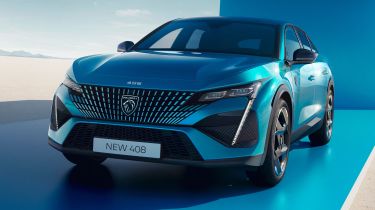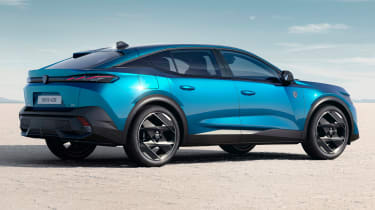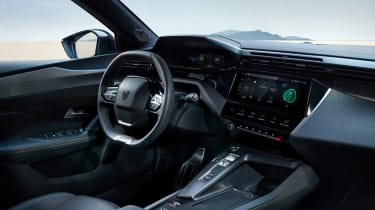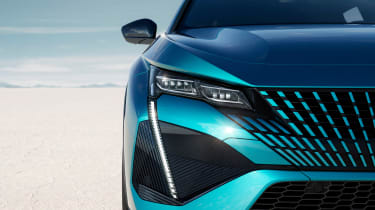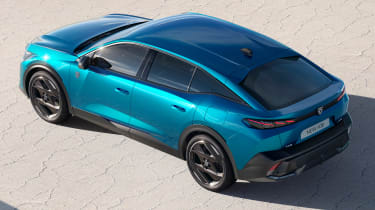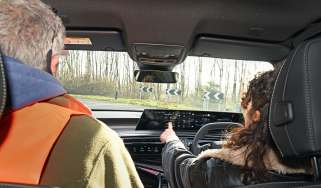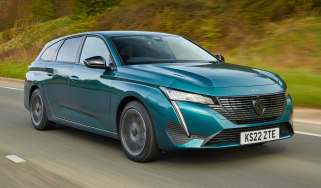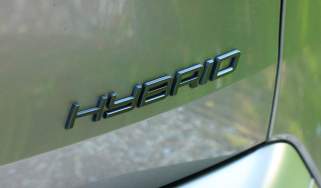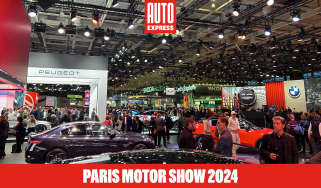New 2023 Peugeot 408: UK prices and specs revealed
Radical new Peugeot ‘lifted fastback’ hits the UK from just over £30k
The Peugeot 408 fastback is now on sale in Britain, and Peugeot has outlined prices for its eye-catching new model, starting from £31,050. Plug-in hybrid models are a key part of the mix too, with the PHEV line-up kicking off from £38,400.
The new 408 range opens with the 1.2-litre PureTech 130 model, utilising a turbocharged petrol engine with 128bhp and sending drive to the front axle via an eight-speed automatic transmission - the gearbox being standard across the entire line-up. Two plug-in hybrid options combine 1.6-litre four-cylinder petrol power with battery and motor technology, available with 178bhp in the HYBRID 180 model and 222bhp in the HYBRID 225 version of the 408.
Trim levels begin with Allure, with standard equipment including 17-inch alloy wheels, LED headlights with adaptive beams, and partial man-made leather upholstery. A Peugeot i-Connect infotainment system is equipped with connected navigation with over-the-air updates along with a 180-degree reversing camera.
Allure Premium is the next rung up the ladder. Starting from £32,175, the level of standard kit grows to include 19-inch diamond cut wheels, keyless entry and go as well as additional safety and driver assistance features including advanced emergency braking, front parking sensors, adaptive cruise control, rear cross traffic alert and ‘long range’ blind spot detection.
The GT trim level begins from £34,650 and is distinguished by the sporty styling additions, additional drive modes and extra tech it introduces. GT models come with 19-inch ‘Graphite’ diamond cut wheels and a different looking front grille featuring body-coloured elements. Inside is a full grain leather steering wheel with a heating function, behind which sits a 10-inch digital instrument panel. The Driver Sport Pack introduced on the GT model includes steering, throttle and engine modes designed to enhance ‘feedback and response.’
As is often the case with new cars, a fully-loaded launch edition of the 408 is offered. Called First Edition, it costs £45,000 and is only available with the 222bhp 225 HYBRID drivetrain. 20-inch alloy wheels are included, as is a ten-way electrically adjustable drivers seat and a six-way adjustable equivalent for the front passenger, both seats featuring heating and massage functions. The on-board charger is upgraded to the 7.4kW system, compared with the 3.7kW single-phase charging standard on other plug-in hybrid models in the line-up.
Platform, powertrains and performance
Sitting between the 508 large family hatch and the mid-size 3008 SUV, the 408 is similar to the Polestar 2 in bodystyle. It's essentially a raised-up five-door with a large hatchback tailgate, focusing on practicality and style. Peugeot says it's the first car of its kind on the market.
Much of the 408’s styling is new ground for Peugeot, although there are clear nods to the latest 308.
The 408 sits on the latest evolution of Peugeot’s EMP2 platform and is powered by a single pure-petrol engine as well as plug-in hybrid powertrains. The brand has also confirmed a fully electric variant – likely to be called the e-408 – will follow “a few months later.”
The only non-electrified version will be the entry-level 128bhp 1.2-litre three-cylinder turbo petrol unit – and even this will be replaced by a mild-hybrid variant at the end of 2023, the firm says.
The pair of plug-in powertrains consists of Peugeot’s 178bhp Hybrid 180 and the 222bhp Hybrid 225. Both variants use the same 1.6-litre four-cylinder turbocharged petrol engine mated to an electric motor that’s fed by a 12.4kWh battery, which will take one hour and 55 minutes to charge from a 7kW wallbox. Peugeot claims that up to 40 miles of pure electric running is possible, depending on spec.
All engines are mated exclusively to an eight-speed automatic gearbox, so expect the 1.2 petrol to accelerate from 0-62mph in around 10 seconds. The electric assistance from the plug-in hybrids means they’ll both be quicker despite carrying extra weight, so the Hybrid 225 could dip below 8.5 seconds for the same benchmark sprint.
The fastest version will undoubtedly be the e-408, however. Power will come from a 54kWh battery, which is slightly bigger than the unit you’ll find in the Peugeot e-2008 and e-208, but features a new chemical composition to improve range and efficiency.
Peugeot claims the e-308 will be able to recharge 20-80 per cent in less than 25 minutes with a 100kW charging capacity, so we’ll expect the same for the e-408. A 248-mile range for the e-308 has also been claimed, but with the more upright, less-aerodynamic stance of the e-408, it’ll probably not match the e-308 on that measure.
Design and technology
Project Design Director Pierre-Paul Mattei told us that the 408’s design and positioning is the key to this new model, however.
“The new 408 started a few years ago with the objective of reinventing the saloon. The driving position is dynamic – higher than a saloon but not even as high as a coupe-SUV. It’s for people looking for something new. It’s a very dynamic saloon with the feeling of modern Peugeot DNA.
“Nothing is neutral on this car,” he said. “Everything is doing something. The design treatment is different to what we’ve been used to at Peugeot. It’s sharper, a diamond-faceted design. It’s disruptive. Take the [optional] 20-inch wheels, we tried to integrate the square pattern into a circle.”
At 4.69 metres long with a 2.79m wheelbase, the 408 is relatively long, and at 1.48m tall the feel is more of a raised-up saloon than a coupe-SUV.
Compared with the intricate grille, in profile the 408’s lines are relatively simple, defined by smooth surfaces intersected by sharp creases and a more rounded shoulder line. The rear-end design is as elaborate as the front, with the lower plastic part of the bumper creating an “inverted cut-out” as part of the high-set, chopped-off tail with the aim of reducing its visual mass and reinforcing the 408’s raised stance. The car will come in six body colours, including this new Obsession Blue.
Despite the 408’s sleek profile, which also helps reduce drag to 0.28Cd, there’s been a significant focus on practicality, as Mattei told us. “Roominess was really a challenge with this car, it offers the most kneeroom in the rear of all the Peugeot range, at 188mm. It’s a worldwide car that integrates expectations for spaciousness from the Chinese market.”
Incorporating those requirements should be beneficial for European customers too, and sitting in the car at the 408’s unveiling we found there to be a good level of space. Despite the low roofline Peugeot claims plenty of headroom too, with little relief areas in the roof at the rear to boost space.
When it comes to luggage room, the ICE version offers 536 litres with the rear seats in place rising to 1,611 litres with the backrests folded down, while the PHEV models serve up 471 litres with the rear seats up due to the battery eating into space.
The dash design is the same as the 308 hatchback’s, so the 408 also boasts Peugeot’s evolution of its i-Cockpit interior layout, including the centrally mounted 10-inch i-Connect Advanced infotainment system with the brand’s latest touch-sensitive i-Toggles mounted lower down.
Alongside this latest infotainment set-up, which features over-the-air update capability and Peugeot’s voice recognition tech, the 408 will also be available with plenty of advanced kit, such as a 10-speaker Focal stereo, matrix LED headlights, the ability to connect two smartphones through the latest connectivity packages, four USB ports and wireless charging. A powered tailgate with a foot-activated sensor and heated seats will also be available, plus Peugeot’s latest semi-autonomous driving tech.
The brand’s Drive Assist 2.0 package brings semi-automatic lane changing, while adaptive cruise control with lane follow and lane keep assist also feature. There’s a night vision system, as well as cross traffic alert and long-range blind spot monitoring all on offer, while Peugeot has developed thicker, laminated windows, available as an option, to further improve refinement.
Now check out our list of the best family cars...
Find a car with the experts

